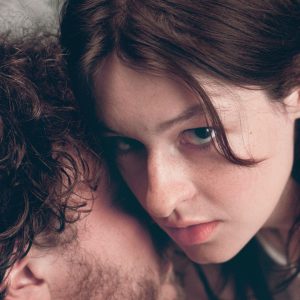 On the morning of the release of her second album, Lou-Adriane Cassidy posted on social networks a list of the things she learned while making Lou-Adriane Cassidy vous dit : Bonsoir. Among them: “We can do everything, when you think about it.” And since we’re talking, we ask her to elaborate.
On the morning of the release of her second album, Lou-Adriane Cassidy posted on social networks a list of the things she learned while making Lou-Adriane Cassidy vous dit : Bonsoir. Among them: “We can do everything, when you think about it.” And since we’re talking, we ask her to elaborate.
I was with Thierry Larose and Al [Alexandre Martel, the album’s co-producer and her boyfriend],” she says. “We were working on Thierry’s new song after micro-dosing LSD, and during my trip, I wrote ‘We can do everything, when you think about it’ in my phone. I felt it in my very core, and it became a leitmotif for the whole album.”
Her first album, C’est la fin du monde à tous les jours (2019), largely followed a concept of songwriting more associated with the tradition of the great interpreters to which her mother (Paule-Andrée Cassidy) belongs, rather than that of the unbridled freedom of rock. Among the other learnings on the aforementioned list: “I have learned to be proud of myself.” That’s no small admission.
“It’s like I always felt like what I was doing wasn’t in line with who I was,” says Cassidy. “I thought, ‘It doesn’t have to be a big deal, your art isn’t supposed to represent the whole of who you are.’ But I was always uncomfortable with the image I gave off, and who I felt I was in my life.” It’s no surprise, then, that this exhilarating sophomore album feels like the thrill of meeting someone for the first time.
Hubert Lenoir, for whom she was a backing vocalist, is a shining example of an artist refusing to be anything other than himself, in all circumstances. “Every other day I still have doubts and think that I suck,” she laughs, as if not to imply that she now knows all the secrets of Zen and self-love. “But I have this certainty that I’ve achieved what I wanted. I’ve understood that it’s possible to be proud of yourself in the creative process.”
Somewhere between ’70s soft rock (a style dear to Alexandre Martel) and the elegant cockiness of Liz Phair’s Exile in Guyville, Lou–Adriane Cassidy vous dit: Bonsoir shines – not only through good taste and a mastery of its references, but also through that rare wisdom of not making a song last just to make it last. “It’s not because the songs are short that they’re coitus interruptus,” jokes the singer, not missing an opportunity to jump on a sexual metaphor, since it’s a theme that permeates that album.
It’s undoubtedly a slippery subject, but Cassidy embraces it with just the right combination of clarity and impressionism that allows her, and her writing partner Martel (him again) to avoid the sad-sack metaphors with which the “deed” is often associated. Has a man’s ability to not climax too fast ever been celebrated more beautifully than in the line “Je sais que tu sais m’attendre avant d’arriver” (“I know you’re able to wait for me before arriving”)?
“It was always a balance [between vagueness and clarity] that I was trying to achieve,” she says, noting that she even allowed herself to write texts whose meaning only became clear to her after the fact. “J’espère encore que quelque part l’attente s’arrête” opens the album with the vigour of a superbly incisive guitar line, and the deceptively nonchalant grace of a voice that seems to be able to accomplish anything is a perfect example. The singer only understood recently that the song is about orgasms.
“It used to be really unpleasant when I wrote by myself,” says Cassidy. “I was never satisfied. I would just give up and think, ‘It is what it is,’ just because I was fed up.”
“It’s important to have jokes on an album,” Martel often said to her, a belief that should be taken as a reminder: maybe it’s when we take ourselves the least seriously that the most fertile ideas emerge. “Prends-moi… pas pour une conne,” (“don’t take me for a c__t”) she sings on “Entre mes jambes” (“Between My Legs”), fully assuming the pun. “I would never have allowed myself to write lines like that on my own, because I would’ve been convinced they’re lame,” says Cassidy. “But having someone with me that says ‘No, there’s a good idea in there, keep digging,’ was incredibly nourishing.”
“Is this fun, or what?” we hear her say at the end of “Je suis arrivée,” a question that’s greeted by the laughter of a child, namely Odile, Martel’s daughter, whom Cassiday had on her shoulders while recording her vocals to calm the impatient child at the end of a long studio session. “Is this fun, or what?” became Cassody’s modus operandi. In short, the pleasure derived from creativity is probably the only element one is able to control. Or to boil it down to its simplest expression: fun is fun.
“We need to learn to be gentle with ourselves, to put less pressure on what we’re creating and tell ourselves repeatedly that it’s OK to make mistakes,” says Cassidy. “We need to know our strengths, yet when we’re good at something and it comes easy to us, we tend to value that thing less. But in a creative process, quality is never guaranteed. Whether it took you six minutes or two years to write a song means nothing. Sure, you need to have ambition, be thorough, and want to push your limits – but at the end of the day, you have so little control over the end result. The one thing you control is how you’re going to experience the process.”